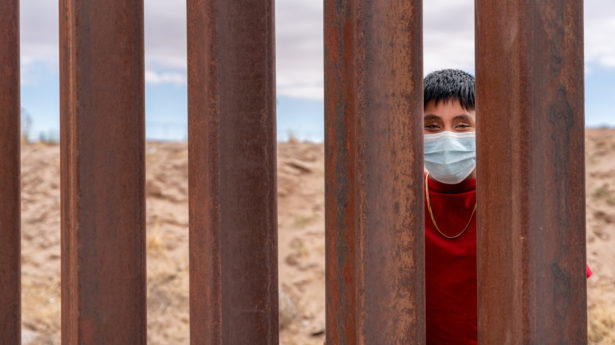The Unitarian Universalist Service Committee advances human rights through grassroots collaborations.
What’s at Stake in the Remain in Mexico Case?

April 28, 2022
The Supreme Court heard oral arguments on April 26 in Biden v. Texas—a case brought by conservative state governments challenging the Biden administration’s revocation of the Remain in Mexico (RMX) program. The legal arguments in the case were complex and often obscured the human dimension of what’s really at stake in its outcome.
If Texas and Missouri win their challenge to the federal government, it would mean the following:
Thousands of people would be stranded in danger.
Since the Trump administration created it in December 2018, under the misleading name the “Migrant Protection Protocols,” RMX has been used to force thousands of people applying for humanitarian protection to wait for their court dates on the other side of the U.S. border.
Stranding asylum-seekers—including families with children—in dangerous conditions had grave and foreseeable effects. RMX puts people at the mercy of criminal networks in Mexico that prey on migrants, often kidnapping those believed to have contacts in the U.S. and extorting them for ransom. Human rights observers have extensively documented the horrific violence asylum-seekers experienced as a result of RMX—and its disproportionate impact on Black, Indigenous, and LGBTQ+ asylum-seekers.
In keeping with their campaign pledge to bring dignity and humanity to U.S. immigration policy, the Biden administration sought to end this program upon taking office in January 2021. However, a Trump-appointed district court judge in Texas ordered them to reinstate it, and the Fifth Circuit Court of Appeals not only kept the lower court’s order in effect—they also refused to let the Biden administration end the program even after issuing a second and more extensive termination memo.
As a result of these court rulings, as well as other anti-asylum restrictions at the border (some of which the Biden administration has all-too-willingly utilized on their own, such as the Title 42 policy), thousands of people are stuck in danger in Mexico right now. They have suffered nearly 10,000 violent attacks just since January 2021, all because they are being denied their internationally-protected asylum rights at the border.
Thousands of people would be caged and cruelly denied their freedom.
If allowed to go into effect as written, the district court’s injunction would not just force the Biden administration to continue RMX indefinitely; it would also vastly expand the arbitrary detention of asylum-seekers on U.S. soil. In making their case, Texas and Missouri adopted an extreme and wholly unprecedented interpretation of the U.S. immigration statute. They read it to require the mandatory detention of nearly every person seeking asylum who can’t be sent to Mexico, vastly scaling back the executive’s power to parole asylum-seekers or release them on bond.
The mass detention of people seeking refuge is already a gruesome fact of the U.S. immigration system that is at odds with international standards. Forcing the government to expand this detention still further would deprive countless more people of their freedom for the months or longer that it takes to resolve their cases. The cruelty and racism of U.S. immigration detention has long been evident, with authorities often inflicting the worst violence and abuse in these facilities on Black asylum-seekers.
Elected officials would lose power to change policy in response to public demand.
In a democratic system, elected leaders are supposed to have the ability to change their predecessors’ policies. If they can’t, then elections have no consequences and the public would lose all ability to influence government decisions. It should be obvious, therefore, as Karen Tumlin recently argued, that the Biden administration can end RMX if it chooses. The policy was a creation of the executive branch, implemented at the discretion of Trump officials. Presumably, that same executive branch also has the power to end it.
Texas and Missouri assert, however, that the Biden administration abused their discretion and acted in an “arbitrary and capricious” manner in ending RMX. This is a strange opinion, since the administration’s second memo terminating the RMX policy supplied far more reasoning to end the policy than the government supplied for creating it in the first place—more than 31 times as much.
In short, the arguments against ending RMX are legally senseless. They would also result in such extreme changes to U.S. immigration policy that—as Texas conceded in Tuesday’s oral argument—not a single prior administration in U.S. history has ever adopted their interpretation of the law.
Apart from the technical legal matters at issue in this case, however, its outcome would have massive implications for people at the border. For thousands subject to RMX, a decision on this case will mean the difference between life or death, confinement or freedom.
We can expect a decision in late June or July. In the meantime, help us call on the Biden administration to act within their executive authority to scale back detention. People don’t belong in danger in Mexico or confined in U.S. immigration jails. They belong in safety, in freedom, with their families and communities on U.S. soil.
Image Credit: iStock – Photo Beto

